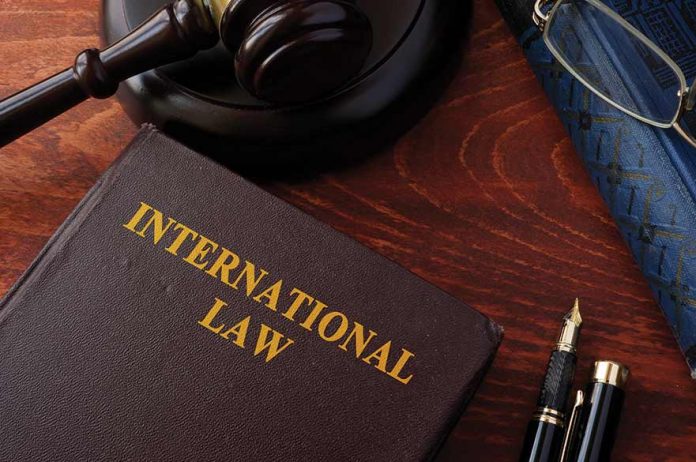This article is written by Shishira Pathak. This article has been edited by Ojuswi (Associate, Lawsikho).
This article has been published by Sneha Mahawar.
Table of Contents
Introduction
The dictionary meaning of ‘eyewash’ is words that are not true or sincere. In today’s world, international laws have become an eyewash and bear no meaning. The reason for that is the manner in which permanent members of the United Nations Security Council (UNSC) behave in the international community. The way in which the main powerful members of UNSC, the USA, China, and Russia treat international laws is depressing.
The USA has been imposing trade sanctions on Russia and China. That is to say that the permanent members are imposing sanctions and restrictions on each other. Instead of controlling rogue nations to follow world order to make such rogue nations respect the international laws, the permanent members are divided among themselves over territorial and border issues and they themselves have become a great threat to international peace. It seems that the world war has gotten extended into a new form of war that we are witnessing today. A threat war is a new type of war, whereby every country in the world threatens its neighbours, so there is a great deal of uncertainty about the war, resulting in a fearful atmosphere. Instead of de-escalating this conflict, NATO and the UN are somehow fueling it by moving out of the way and promoting their interests, specifically those of the USA. UN peacekeeping forces include military personnel from nearly the entire civilised world, but when the time comes to act, UN peacekeeping forces are conspicuously absent. This becomes an example of glimmering failure like in the case of Afghanistan.
The UN has now become a pot of failures which is evident in the present scenario, and it can be proved by a few glaring examples of its failure like the ongoing Somalian civil war since 1991, the Sudan conflict since 2003, and the Syrian civil war since 2011, amongst others.
What is an international law
In layman’s terms, International law can be defined as a law that all the nations of the world abide by and follow while dealing with each other over territorial matters, matters of Prisoners of war, international trade and transactions etc. The Academy of Science of U.S.S.R. defines international law in the following manner: “International law is composed of the rules that govern relations between states in conflicts and cooperation in order to safeguard their coexistence, express the will of the ruling class and defend states when they need to apply coercion individually or collectively”. Thus international laws are a set of rules which prevail among all the states governing their behaviour with the other nations during conflicts, war and times of peace. International laws are rules for bringing order to the mutual relationships of the states.
In short, international law can be summarised as follows:
- It is a set of rules;
- It must be followed by all the nations;
- It exists to facilitate smooth relationships among the states;
- It is a medium of exchange of ideas to be done according to standards widely acclaimed by other nations;
- It is a catalogue of Dos and Don’ts to be followed by the family of nations while interacting among themselves.
Objective of international law
The aim of International law is to do justice among the nations. By establishing justice among the states related to their disputes, international law aims to bring order among the states and the international community particularly in terms of economic developments and peace by achieving friendly trade relations for mutual benefits. States in the family of nations can not make themselves aloof from international dealings and must adhere to the laws followed by their neighbours and other nations for maintaining good relations and for their development which has become more realistic after the establishment of the world trade order.
The South-China Sea disputation and the failure of UNCLOS
South-china Sea, as the name suggests, is in the south of China. It is a portion of the Western Pacific ocean. It is the region where almost one-third of global trade passes and it also connects two of the major water bodies the Indian Ocean and the Pacific Ocean with each other through the Strait of Malacca. China is belligerent here as it has been building many artificial islands in the region for the purpose of armed ventures. The reason for dispute in the region is the claim over three islands namely Scarborough shoal [claimed by Philippines, China, and Taiwan], partly islands [claimed by Philippines, China, Taiwan and Brunei] and the Paracel islands [claimed by China, Vietnam and Taiwan]. The basis of claim over these groups of islands is based on the belief in the presence of natural gas and oil deposits.
China claims that the USA violated its claim over the territorial waters of Paracel islands by moving one of its warships there, and on the other hand, the USA counters China’s allegations by saying such exercise was in line with international law.
The issue was taken by the Philippines to the arbitral tribunal constituted under Annexure-VII of UNCLOS to solve the issue and the ruling of the arbitral tribunal went in the favour of the Philippines which said China’s claims over the nine-dash lines has no legal backing and China’s activities within EEZ of Philippines is violating Philippine’s rights, but China rejected the ruling and acquired a hard-line stance.
UNCLOS is an international convention which provides a framework for jurisdiction in matters of maritime disputes. It was adopted in 1982 and came into effect in 1994. China has rejected the tribunal’s ruling and often asserts its historic claim over the nine-dashed lines jointly claimed by Brunei, Malaysia, Taiwan and the Philippines. China uses its naval power to intimidate its maritime neighbours mentioned above and does not honour the verdict of the arbitral tribunal. Thus, here UNCLOS failed to impose international law of the seas as it has now ceased to have a force.
Economic sanctions
It is an alternative to military action for punishing a country jointly or individually by withdrawing financial and trade relations from the rogue nation. In other words, economic sanctions are penalties imposed on a nation for its uncalled-for actions like a war. In the modern world, economic sanctions are a better option as compared to armed action against the receiving state. Benefits of economic sanctions:
- There is no loss of lives: as there is no war between the nations. No loss of life includes the lives of soldiers and civilians of the nations that might have gone to war with each other for realizing their interests.
- Saving money: The amount of money that might get spent in case of a full-scale war is huge and puts immense pressure on the nations at war. Economic sanctions prevent such losses of money which may be used for greater purposes like the development of the health sector, education and electricity generation.
- It works as a threat: economic sanctions work as a threat to the rogue nation and it can weigh the costs of non-compliance with the conditions of the sanctioning nation.
But in recent years, the effectiveness of economic sanctions has been slowly diminishing. As a result of Iran’s non-compliance with the Joint Comprehensive Plan Of Action (JCPOA), also known as the Iran nuclear deal, the US imposed sanctions on Iran. The agreement, which was reached by the USA, UK, Russia, Germany, and China in 2015, also prohibited Iran from enriching its nuclear fuel and opening its gates to international inspectors But in 2018 USA alleged Iran of non-compliance with the conditions of the nuclear deal and pulled out of JCPOA and imposed sanctions on Iran. This sanction dented the economy of Iran but did more damage to its import bill of India. After Iraq and Saudi Arabia Iran is the largest supplier of oil to India, but having sanctions imposed on Iran the oil prices soared internationally.
Refugees and international refugee law
A refugee is an individual who is ‘forced’ to flee their home because of instability. Refugees face many challenges; they must leave their homes and look for shelter, food, water, employment, respect, dignity, care, happiness, protection, medical facilities, financial and social security, hope, freedom, and a place to live. And that is all in a foreign country. Is it possible to remove the scar left behind by being forced to flee for one’s life even if one gets all of this detailed above?
All the damages can be undone but the emotional damage cannot be undone. A refugee is someone who is never the same person who fled from his own home. The refugee crisis is a huge problem and there are millions of refugees in this world who have fled their homes to save their lives. The worst affected region by the refugee crisis is the African region. The people of the Central African Republic, Sudan, Eritrea, Syria, the Democratic Republic of Congo Somalia, South Sudan, Afghanistan etc all have left their homes because of war, civil war, sectarian conflicts, climate change-related violence, regional conflicts etc.
In 1951, the world became aware of the refugee issue and created a framework to safeguard refugees, which became known as the UN convention on refugees. The convention has granted some rights to a refugee. A few of them are:
- Right to not be punished
- Right to be issued important documents for travel and identity
- Right to housing, education, work
- Right to not be expelled (conditional). The countries hosts of the refugees who have ratified the UN refugee convention also face a greater number of problems while settling the refugees which can be enumerated as follows:
- Economic cost: The host countries face a huge economic burden when they come face to face with the influx of refugees from neighbouring countries. They have to take a portion of their expenses which was set aside for the development and benefit of their citizens and spend them on the welfare of refugees.
- Lack of international assistance: In the wake of the refugee crisis the host nations face a shortage of assistance from the international community to help them in settling the refugees. This is either due to unwillingness towards the cause on the part of the international community or they are themselves facing problems.
- Increase in crime: With the coming of refugees the host country’s citizens see a refuge as a competitor. They think that now they have to share everything with the refugees as their nation has ratified the UN convention. This leads to the development of hatred of the host communities towards the refugees and results in further instances of crime toward refugees
- In the wake of the Covid crisis, there are restrictions on the movement of people internationally. This increases the problem faced by the host nations as the desperate refugees to save their lives and in the hope of better conditions or treatment may try to get into the host nation illegally and by doing so may spread the pandemic even more.
Failure of international laws and UNO
UN made different laws and devised charters but in totality, the UN has failed to control wars, this can be seen in the following examples:
- Syrian Civil War: Earlier UN tried to resolve the Syrian crisis but it failed as the permanent members of the UNSC are directly or indirectly involved in the Syrian Civil War.
- The US war on Iraq: US in violation of Article 2(4) of the UN Charter invaded Iraq as it had apprehensions that Iraq was developing weapons of mass destruction.
- UN’s dependence on P5 Nations: It is true that UNO depends on the veto of P5 nations. One glaring example is the use of veto by Russia to protect the Assad regime in Syria.
Angary and neutrality-
Neutrality means the impartial behaviour of a third state towards the belligerents in case of a war. Neutral states are formed in case of a war, whose status is recognized and respected by the states at war with each other. In simple terms, neutrality is the way by which a state conducts its activities with the nations at war by keeping itself out of war.
Angary, on the other hand, means the right of a belligerent state to, ‘use, occupy, destroy the property of a neutral state within the territory under its jurisdiction. Angary is the direct violation of the right of a neutral state like immunity from hostility i.e. it has the right to protect its territory and property from the use and destruction by belligerent states.
An example of a violation of neutrality can be viewed in the disaster of the MH17 aircraft in Malaysia. Malaysia has a neutral stance over Ukraine and Russia conflict but Western countries blame Russia for taking down the flight, however, such claims are absolutely denied by Russia. Whatever may be the truth, the neutrality right of Malaysia got violated by the incident.
One more example may be the use of anti-satellite weapons which if used by two warring states against each other may destroy or damage life and property in a neutral state. Satellites destroyed by anti-satellite weapons become directionless and uncontrollable and may fall on neutral state territory, violating its neutrality.
Conclusion
The existing international legislative system is incapable of bringing order to the world. Rather than protecting the world order, the United Nations is failing, NATO failed to defend Ukraine, and the USA fled Afghanistan. Making a small nation which is underdeveloped and facing internal problems is not expected to follow international rules but nations that have been developed for 300 years or who have recently reached economic developments are expected to follow the international laws and if international laws fail to make them comply with the given set of rules then in the present scenario the international laws have failed.
Students of Lawsikho courses regularly produce writing assignments and work on practical exercises as a part of their coursework and develop themselves in real-life practical skills.
LawSikho has created a telegram group for exchanging legal knowledge, referrals, and various opportunities. You can click on this link and join:
Follow us on Instagram and subscribe to our YouTube channel for more amazing legal content.
 Serato DJ Crack 2025Serato DJ PRO Crack
Serato DJ Crack 2025Serato DJ PRO Crack













 Allow notifications
Allow notifications


